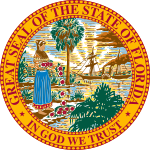| |||||||||||||||||
| |||||||||||||||||
 County results Shevin: 50–60% 60–70% 70–80% 80–90% Rumberger: 50–60% 60–70% | |||||||||||||||||
The 1970 Florida Attorney General election was held on November 3, 1970. Robert L. Shervin would be elected winning 61.43% of the vote and defeated Thom Rumberger. [1]
| |||||||||||||||||
| |||||||||||||||||
 County results Shevin: 50–60% 60–70% 70–80% 80–90% Rumberger: 50–60% 60–70% | |||||||||||||||||
| Elections in Florida |
|---|
 |
The 1970 Florida Attorney General election was held on November 3, 1970. Robert L. Shervin would be elected winning 61.43% of the vote and defeated Thom Rumberger. [1]
The Democratic Party would hold its primary on September 8, 1970. [2]
The Republican Party did not hold a primary as Thom Rumberger was unopposed. [4]
Robert L. Shevin, Democratic
Thom Rumberger, Republican
| Party | Candidate | Votes | % | ±% | |
|---|---|---|---|---|---|
| Democratic | Robert L. Shevin | 943.776 | 61.43% | −4.76'"`UNIQ−−ref−00000049−QINU`"' | |
| Republican | Thom Rumberger | 592,519 | 38.57% | +4.75 | |
| Democratic hold | Swing | ||||